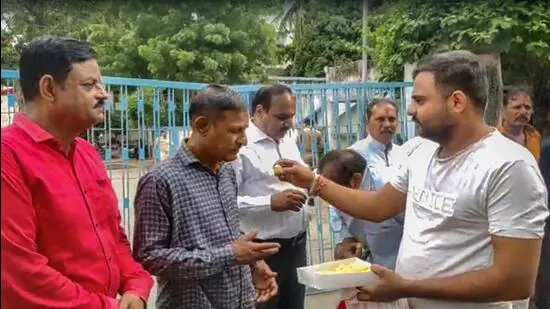In the rampage that followed the 2017 conviction of Dera Sacha Sauda (DSS) chief Gurmeet Ram Rahim for murder and rape, 30 people were killed, 200 injured and vehicles and public property were set on fire as his followers clashed with police.
Rahim had been sentenced to 20 years of hard labour. In the five years since he’s been lodged in Sunaria prison, he’s been sent home on parole or furlough at least six times.

His time-out has coincided with elections in Punjab, Haryana and Himachal Pradesh where he continues to wield extraordinary influence amongst an estimated 70 million followers, claimed by DSS.
This year alone he’s been out three times. His time out between February 7 and 27 coincided with the Punjab elections on February 20. His 30-day parole on June 17 came two days before municipal elections in Haryana. And, now in October when he’ll be home for 40 days, there’s an assembly election in Himachal Pradesh and a bypoll in Adampur, Haryana.
It’s pretty blatant, “a clear instance of quid pro quo”—get out of jail in return for his cadre’s support in the election–Rajendra Sharma, a political science professor in Rohtak told Hindustan Times.

At his daily online satsang sessions, BJP leaders flout their presence. “They were attending as devotees,” Haryana BJP spokesperson Sanjay Sharma said of the presence of BJP leaders, including the Karnal mayor. Rahim, Sharma added, is to be praised for his cult’s cleanliness drive. “We should appreciate the positive sides,” he said.
Home ministry okayed the release of 11 rapists and murderers
Assembly elections are imminent in Gujarat too where the shocking release earlier in August of 11 men sentenced to life imprisonment for gang-raping a five-month pregnant Bilkis Bano and others, killing seven people, including her infant daughter, in the carnage of 2002 had the blessings of the home ministry.
An investigation by The Indian Express reveals that on average each of the 11 spent 1,000 days—two years, seven months—out of jail, on parole, furlough and temporary bail.
During their time out, two men, Mitesh Chimanlal Bhatt and Ramesh Chandana were charged with new offences of outraging a woman’s modesty and intimidation.
Union minister Pralhad Joshi told NDTV: “I don’t find anything wrong in it [the remission] as it is a process of law.”
The men’s release came despite opposition from authorities, including the superintendent of police, CBI, Special Crime Branch, Mumbai and the special civil judge at the City Civil and Sessions Court, Greater Mumbai. The special judge in fact refused to sign off the remission request, stating that the crime was committed only because the victim belonged to a ‘particular religion’ and that the crime committed was the “worst form of hate crime and crime against humanity”.
On Friday, the Supreme Court agreed to hear a fresh plea filed by the National Federation of Indian Women challenging the remission order and the release of the convicts.
Politics as usual
So, how and why were the men released amidst an obscene display of triumphalism where they were garlanded, fed laddoos and, a day later, feted by the Vishwa Hindu Parishad in its office.

Can a political party actually believe that the release of rapists will win it brownie points with the electorate? And what does this say about the morality of us as voters?
The silence from the Aam Aadmi Party, seeking to make inroads in the Gujarat election, is telling. On the campaign trail in Gujarat, Manish Sisodia was asked to comment on Bilkis Bano and replied: “We stand for education, hospitals and jobs. This is what we are concerned with. People should speak about their concerns.”
How can justice for rape survivors, for women who fight against the system for decades despite death threats and hostility, not be a concern for every Indian?

IN NUMBERS
The share of women managers in ASEAN countries rose only 2 percentage points in 20 years, from 39% in 2000 to 41% in 2020. Women also make up 67% of health-care workers but only 11% of chief executive officers in the region’s biggest hospitals.
Data on women’s leadership made available by UN Women at the 2nd ASEAN (Association of South-East Asian Nations) Women Leader’s Summit.
WE HEAR YOU
“Rule of law, if understood and implemented properly, is a defence against oppressive structures such as patriarchy, casteism, and ableism.”
Justice Dhananjay Y Chandrachud, who will be sworn as the next chief justice of India on November 9, speaking at the 9th Convocation of National Law University, Delhi.
STORIES YOU MIGHT HAVE MISSED
Can Muslim girls marry at 15?
Following a recent Punjab & Haryana high court judgment that gave a minor Muslim girl the right under Muslim personal law to marry a person of her choice once she attains puberty at 15, the Supreme Court on Monday began examining the issue. “There is a question of law that requires consideration,” a bench of justices Sanjay Kishan Kaul and AS Oka observed as it set the next date of hearing on November 7. Under Indian law, the minimum legal age of women to marry is 18.
Male students run riot at Miranda

A Diwali fair at Delhi University’s prestigious women’s college, Miranda House took a horrible turn when male students scaled the gates and walls to enter and harass those present. “Cat-calling, groping, sexist sloganeering and more,” tweeted a student of the college. Delhi police first said it had received no official complaint but then registered a case on Monday against unnamed people after a video of the incident went viral, highlighting, yet again, the precarity of women’s safety in public spaces and, even, in their own college.
The strange case of a fake rape
News of the abduction and gang-rape of a 38-year-old woman in Ghaziabad led to five arrests and considerable outrage. Delhi Commission of Women chairperson Swati Maliwal compared the crime to the December 16, 2012 gang-rape and said the woman too had been mutilated by the insertion of an iron rod. She tweeted that the woman “is fighting for her life in hospital” and issued notice to the police.
The chairperson of the National Commission of Women said it was sending a fact-finding team.
Five men, Deenu, Shahrukh, Javed, Dhola and Aurangzeb were arrested.
It now turns out that the gang-rape was faked by the woman, her boyfriend and her brother over a property dispute, according to the police investigation.
The five arrested men have been let off and a case has been registered against the woman and three others, including a journalist who was paid off to sensationalise the story. The woman continues to stand by her story of being raped.
…And the good news
The women’s Indian Premier League is finally set to become reality early in 2023. This is not a result of a sudden gender awakening by the Board of Control for Cricket in India, but the sheer hard work and tenacity of women who play cricket. Led by Hamanpreet Kaur, the team brought home a silver at the Birmingham Commonwealth Games and clinched a one-day international series in England.
Audiences are lapping it up. The cumulative global TV audience for the 2022 ICC Women’s Cricket World Cup was 104.8 million, making it the third most digitally engaging event after the ICC Men’s Cricket World Cup (2019) and ICC Men’s T20 World Cup (2021).

AROUND THE WORLD
In the UK, Liz Truss, her country’s third woman prime minister who had described herself as a ‘fighter not a quitter’ resigned after just 45 days in office – the shortest tenure ever in that country.
In Teheran, 15-year-old Asra Panahi died after she was beaten by security forces during a raid on her school where students were attacked after they refused to sing an anthem praising Ayatollah Ali Khamenei, reports BBC. Meanwhile, Elnaz Rekabi who represented her country at the Asian climbing championship in Seoul without covering her hair returned home to cheering supporters. She told state television that the omission had been ‘unintentional’. Sources say the statement was forced out of her.
In Sudan, a 20-year-old woman sentenced to death by stoning for adultery has caused outrage by the International Federation for Human Rights which has called on the Sudanese authorities to overturn the ‘cruel, inhuman and degrading punishment’ and release the woman. The sentence was passed in June by the Kosti criminal court in the White Nile State.
| Were you forwarded this email? Did you stumble upon it online? Sign up here. |
| That’s it for this week. Do you have a tip or information on gender-related developments that you’d like to share? Write to me at: namita.bhandare@gmail.com. |